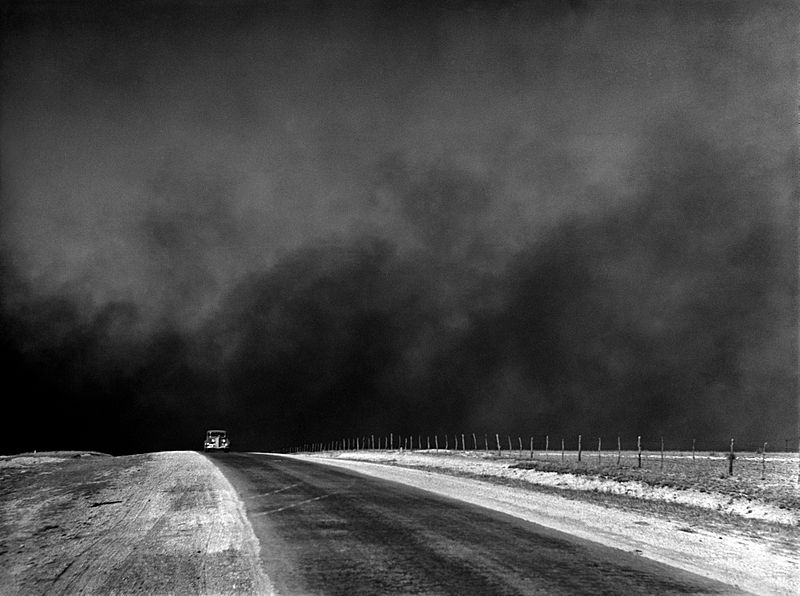A Review of “Dust Bowls of Empire” by Hannah Holleman
– Tim L.
Lack of action in the face of scientifically predicted doom may feel like a unique feature of 21st century life. Whether it is the refusal to address climate change by politicians of all stripes, or the delusional denial by the President of the United States of a pandemic unraveling before our eyes, science denialism is an ever present theme in our public discourse. However, the inability of societies to respond to scientifically predicted crises has a much longer history. Amherst College sociologist Hannah Holleman’s Dust Bowls of Empire: Imperialism, Environmental Politics, and the Injustice of “Green” Capitalism (Yale Press, 2018) is a perfect case study on how inaction in the face of mounting evidence can lead to a geographically and temporally far-reaching catastrophe.
Like much of American history, popular narratives of the Dust Bowl – the deep, years-long drought that ravaged the Great Plains of North America during the 1930s – are steeped in American Exceptionalism, framing history in terms of Americans’ hard work and patriotism rather than colonialism and racial capitalism. As the textbook story goes, unsuspecting colonial settlers who were just doing their best to survive and prosper under the difficult conditions of the Western Frontier were caught up in a terrible natural disaster at an inopportune time. These settlers faced extreme drought conditions that caused infertility of soil and lack of food, which in turn caused extreme unemployment of farmworkers. These conditions both helped cause and were made worse by the wider economic hardship of the Great Depression. Fortunately, many of these heroes were able to persevere, survive catastrophic conditions by subsisting solely on love of country, and continue pursuing their destiny on lands further west. Or so the story goes.

Holleman’s book confronts this narrative, not only challenging the idea that the Dust Bowl was a crisis uniquely internal to the United States, but also directly linking the political, social, and economic conditions that drove the disaster to the global context. Most notably, Holleman lays out how westward imperialism driven by a desire for white capitalist hegemony over land – the policy known as “Manifest Destiny” – is linked directly to similar projects across the globe, including Africa, India, and Latin America.
A striking aspect of the book is the considerable historical record showing that colonial scientists and their governments were well aware of the problem of soil erosion in the decades leading up to the Dust Bowl disaster. This fact is both illuminating and potentially disheartening to the modern reader. It first reinforces the point that no amount of scientific knowledge guarantees scientific solutions to problems under capitalism, either historically or in the current day. Responses to disaster, whether economic, ecological, or epidemiological, must be at the level of collective action and the challenging of cultural domination by reactionary forces who would sow the soil until it is all dust.
But more sobering than the futility of these warnings is the fact that they were erased from popular understandings of history. This shows the power of narrative – in this case white supremacist settler colonial narrative – to distort the historical record. The result is the erasure of social and political context that allows a truly human caused disaster such as the soil erosion that led to the Dust Bowl, preceded by the replacement of indigenous agriculture with the capitalist mode of agricultural production, to be presented as an unforeseeable natural disaster. Holleman’s narrative makes clear not only that the disaster could have been predicted, but that the effects of soil erosion, including “loose and blowing dust”, were well known by the late 1920s (as well as for thousands of years before).
Holleman’s book further describes the ways in which intensive agricultural practices fed extractivism by the imperialist governments of Europe and North America, including not only Westward expansion within the United States, but also colonization of the South Pacific. In an attempt to revitalize their lost soils, Britain and the the United States began importing nitrate-rich guano; this required land grabs and military power, as guano-covered islands were wrested from colonized people, allowing for continued agricultural production in the short term, but degradation of the soil for generations to follow. This “robbery of the soil” (as coined by Justus von Liebig) fundamentally changed the global system of production and consumption of food and informed Marx’s idea of the metabolic rift from nature, in which capitalist production extracts resources from nature in an unequal exchange, replacing the extracted natural material with, for example, imported guano.
Fast forward to today, when the imperialist drive for new resource extraction has developed into a financial drive for a constantly expanding flow of capital through expansion and creation of markets across the globe. Consider the US government’s economic response to the current pandemic: in order to prop up a receding global economic system whose sole hunger is growth by any means, the Federal Reserve Bank gave a $1.5 trillion loan to liquidize bank assets. Less than an hour later, markets continued to freefall. This can be viewed as evidence of the fragility of US financial hegemony, which is often credited as driving the global economy. At the same time, working people have been left with cut hours and potential layoffs, empty supermarket shelves, and lack or loss of insurance to cover visits to unprepared and overwhelmed healthcare facilities. And to top it all off, the first Congressional package passed in response to the pandemic does not require employers with more than 500 workers – places like Walmart, Target, and McDonalds – to provide paid time off, nor does it provide sufficient relief for contracted workers.
These events reflect the backdrop against which Holleman draws out the concept of accumulation of catastrophe, coined by John Bellamy Foster after William H. McNiel’s concept of the law of the conservation of catastrophe. The idea is that our ability to wreak havoc in our environment is an unavoidable consequence of our power to change it, and that our capacity for havoc increases with technological sophistication. In Foster’s version the mechanism remains the same, but the pace is accelerated significantly such that old havocs are not resolved before being displaced or exacerbated by short-term “solutions”.
Accumulation of catastrophe gives name to what many of us see around ourselves as we try to grapple with the climate crisis in the long term or the COVID-19 pandemic in the short term: the fight of our lives often feels like a siege on every front, where the enemies are not only those on the opposite side of the barricades – the fossil fuel, insurance, and pharmaceutical executives – but also within our own walls, where we are engaged in a perpetual fight against the idea that capitalism can “go green”, or that it will equitably develop and distribute “affordable solutions” to a public health crisis, no socialization required. This creates a constant tension in the relationship between ostensible allies who lean towards opposite sides of a well known ideological spectrum – between the reformers who would maintain course and work towards reforming the capitalist system, and the revolutionaries who believe that only class struggle, the abolition of private capital, and full decommodification of human need can serve as the transformative forces that minimize catastrophe in any of the social, political, economic, ecological, and epidemiological realms. Cooperation between groups working in each of these domains, both today and throughout history, is usually contingent on an uneasy and unspoken truce, mostly in the form of harm reductions, between activists who identify themselves as mostly aligned with one or the other of these positions.
Dust Bowls of Empire takes this tension seriously and serves as a sobering warning against relying on even our most aspirational political programs, such as a global Green New Deal or similar international cooperations like the Paris Climate Accord or the World Soil Compact, to save us. Holleman is not optimistic in analyzing the potential for these programs, designed by “self-identified environmentalists positioning themselves as architects of a new capitalism,” to address climate change and inequity, either scientifically or in terms of climate justice. From their inception, many of the ideas that form the backbone of these programs have been drawn from ecomodernist and technocratic sources which, no matter how well intentioned, are invested in preserving the status quo rather than challenging it, while giving the appearance of addressing the multi-faceted crises we face and a false sense of optimism about the odds of our success. Instead of subverting our movements to existing power, Holleman suggests we should commit to a “deeper ecological solidarity”, in part by adding restitution, reparations, restoration, and revolution to our repertoire of principles and strategies, updating the old reduce, reuse, and recycle paradigm.
As we collectively face down a global pandemic, we must simultaneously wrestle with the social and historical question central to Holleman’s book: when the dust settles on this outbreak, which story will survive? Will we remember the damage caused during the pandemic as a failure of political institutions and social organization? Or will the pandemic appear in our history books as an unstoppable and unpredictable force of nature?
Right now, travel restrictions intended to serve public health are being framed as “closing borders” by the xenophobic Trump government; students are being forced away from their university homes, the most vulnerable of whom are likely to face difficulties returning; empty airplanes are spewing carbon above and between continents to maintain arbitrary economic advantages in an already heavily centralized industry; and the majority of wage workers are forced on to the front lines of an epidemic, clinging to their material livelihoods while greedy employers hunker down and refuse to share the burden. Implicit and explicit institutional defense and promotion of the worst outcomes of these decisions are the modern extensions of early 20th century agricultural power brokers encouraging colonizers to continue West as soon as the soil inevitably blew away: it is our destiny to grow, expand, and exploit, no matter the cost.
However, even within this global crisis, we have an opportunity to take hold of the narrative and change the course of history. Through the spontaneous formation of mutual aid groups across the US, suspensions of evictions, release of prisoners, moratorium on utility shut-offs, provisions to battle food insecurity by local governments, calls for homes guarantee and public housing, and even conservative politicians calling for a universal basic income, there remains a glimmer of hope that we have the power to remake this world and stem the tide of profiteering and exploitation.




Leave a Reply